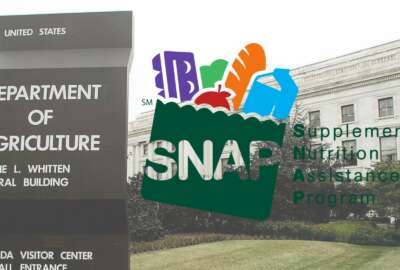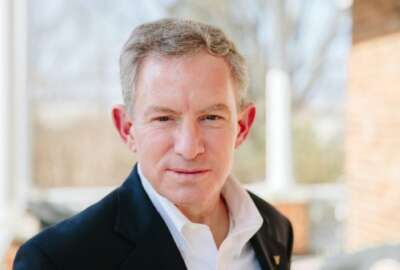Ever wonder why its the deputies in government who do the actual work? Ask Elizabeth Capello
In a long federal career, Elizabeth Cappello has typified people who get things done. A former Marine, she worked at the old U.S. Customs Service, later at U.S.
In a long federal career, Elizabeth Cappello has typified people who get things done. A former Marine, she worked at the old U.S. Customs Service, later at U.S. Immigration and Customs Enforcement. Now, she’s the deputy chief information officer for the Homeland Security Department. The Federal Drive with Tom Temin talked to her about her storied career, that just had an exclamation point attached to the end of it with a Presidential Rank Award.
Interview Transcript:
Tom Temin And you really have had a long career. And information technology can be a frustrating place where a lot of projects go to die or cost too much or take too long. But you’ve gotten some things done cited just in your bio, DHS. Tell us about what you’ve done recently.
Elizabeth Cappello Well thank you. I think there are folks who know me really well who would probably characterize me as lacking in any semblance of patience. I have been committed to the DHS mission since leaving the Marine Corps, and frankly, it’s hard not to just want to do and do anything and everything possible to serve this mission more effectively and more efficiently. So when I got up to the department, it was really an interesting career shift for me, going from I’ve been out in the field, I’ve been working directly with operators for my entire life, and then to get to a headquarters entity, you sort of go, okay, I have to shift how I’m thinking about how I serve the mission and what are the broader impacts. What are the things that I can do up here that will really make a difference across the board? Not for a single component, but for all the components. Well, first and foremost was the wide area network and modernizing that transport mechanism because it serves the entire department. And frankly, all of the wonderful new technology whiz bang tools aren’t very useful if the person out at the edge in the field can’t get to them. So, my first focus was getting that wide area network stabilized and modernized. And of course, that happened right at the same time that we are transitioning the major contract, the EIS enterprise infrastructure services contract.
Tom Temin Right. And I wanted to ask you separately about that too, because but just to get back to the idea of the enterprise network, it’s more than just a technical thing, because the major challenge of DHS since its inception has been to become an integrated agency.
Elizabeth Cappello That’s such a great point, and I think cohesion has been a hallmark of the last three years during this administration. There’s been a real emphasis on putting together the tools and the mechanisms that will allow for better collaboration across the components. You know, we came together with disparate mission sets, disparate funding streams. There are all kinds of mechanisms there. And so, getting the technology in place and modernized to where the components can leverage it to collaborate and to enhance cohesion has been really important. And I think we’ve been very successful.
Tom Temin And you did get, as you said, DHS to switch from the GSA old networks, legacy contract to EIS. And everyone’s supposed to do that. But I think what’s interesting is only half the agencies actually have way past the deadline. So, what did that take? That should be a poster child for what everyone’s supposed to do here.
Elizabeth Cappello Yeah, frankly, I mentioned earlier, I don’t have a lot of patience. That one’s been a stickler because I think, you know, if you start with just the notion of trying to transition the entire civilian federal government at the same time, their networks, I think it sounds good in theory. You get economies of scale; you get these large contracts in place that everybody can use. But the practicality, the reality of actually executing those transitions, right. While you’re trying to modernize, while you’re trying to update your environments, and everybody is trying to access the same resources at the same time. In hindsight, probably not the best approach. And I’ve talked with GSA about this extensively and given some recommendations on what maybe they could consider the next time around, because I think all of us have struggled, and particularly the large agencies, we are competing with one another. Right. And there’s only so much, you know, it’s easy to say, well, the vendors aren’t meeting and, you know, contractual obligations. And but in fairness to them, this was a lot of work at one time. And then obviously we all got hampered by Covid, which impacted everyone’s ability to meet those transition goals. And so, I think it was a perfect storm of challenges. But I am very hopeful right now. Everybody is on the right trajectory to get transitioned, and I really appreciate the partnership both across the federal government. I you know, I’ve worked extensively with DOJ as well on this and with the vendor community to meet those. Of his goals. It’s a lot of work.
Tom Temin We’re speaking with Beth Cappello. She’s deputy chief information officer at DHS and also a winner of a presidential Rank award this year. And let’s go back in history a little bit. You mentioned after joining the federal civilian part of government after leaving the Marine Corps, what in the Marine Corps did you gain in terms of the ability to get things done and lead people in other contexts than the Marine Corps?
Elizabeth Cappello So I think anyone who has served in the military, and especially in my Marine Corps, will tell you that at a very young age, you are given high levels of responsibility. I was a supervisor, a noncommissioned officer and NCO at 19 years old. And so, you’re leading people and you’re responsible for everything. You’re responsible for ensuring not only that the work gets done, but that they show up for work, that they’re paying their bills on time, that they’re caring for themselves, physically, emotionally, managing their careers. So, I think that level of responsibility for people at an immature age carries over into everything else you do because frankly, look, as leaders, we’re not doing the work. It’s the workforce. It’s the people around us. It’s our teams who are getting things done and caring for those teams, caring for those people, knowing their strengths, knowing your own strengths and weaknesses. These are all leadership traits that are taught from the beginning in the military and in the Marine Corps. You’re expected to be a leader from day one.
Tom Temin And when you don’t have the, say, command and control authority that you do in the military, when you’re in a nonmilitary setting, how do you then project that idea that what happens outside of the workplace but yet affects the workplace, such as people’s personal comportment and their ability to keep up with their bills and these kinds of things because they can’t spill back into the workplace? How do you project that caring when legally it’s none of your business, but yet you do care, and you want the work to get done, and you care about the people themselves.
Elizabeth Cappello Sure. You know, one of the things about being part of a large law enforcement organization, as you mentioned, I went from the Marine Corps to the legacy U.S. Customs Service. I worked extensively with Immigration and Customs Enforcement and also Customs and Border Protection with the U.S. Border Patrol. One of the things about working with law enforcement is that idea of caring for people is part of the culture within the law enforcement community as well. DHS has some wonderful employee assistance programs. We’re encouraged to care about our employees. And look when you’re managing the work and supporting the mission. If you’re seeing behaviors or activities that are impacting the ability to serve a mission, then as a supervisor, as a leader, as a manager, your job is to talk with the employee and try to understand how you can help them be successful. And you can do that without getting too far in the weeds with their personal issues, but recommending resources that are available to all employees. But that’s paying attention. It’s paying attention. It’s knowing your people. It’s understanding when behavior is anomalous and when you start to see things that don’t quite make sense. So first and foremost, know yourself, know your people.
Tom Temin And for someone who might be moving from the non-supervisory ranks up to the supervisory ranks and eventually perhaps on to the senior executive service as you have achieved. What’s your best advice for people that have been doing? Because it’s not necessarily the same challenge as when you’re not doing, but rather managing and supervising. What is the expression? What got you here may not get you there.
Elizabeth Cappello And do you know what? That’s a very important phrase because.
Tom Temin And by the way, that’s not original. That’s from Bill Toti, a well-known naval officer who, you know, coined that in a book about his transition. And what got him high in the military wasn’t necessarily a recipe for success in the business world.
Elizabeth Cappello And I think you point out a very valuable technique that all leaders should follow. And that’s continuous learning, right? You read books, you look to models, you look to others’ experiences. And one of the things that I think particularly that transition from non-supervised, especially in the technical arena, you know, you’re very technical. You got promoted because you understand the technology you’re delivering against the technology. Now somebody says but your primary responsibility is going to be for people. Those two things don’t necessarily go hand in hand being super technical and being a leader of people. So, learn and grow continuous improvement. And I would also say start with recognizing that if you’re going to make that transition into a supervisory or management or executive role, that you are shifting your focus, and your focus does need to be on the. Because none of us is successful without those teams. So that would be my number one thing is to recognize it’s it’s a responsibility.
Tom Temin Beth Cappello is deputy chief information officer at the Homeland Security Department, and a winner of a presidential Rank award this year. Thank you so much for joining me.
Elizabeth Cappello Tom, it’s been an absolute pleasure and privilege. And, uh, thank you for allowing me to highlight the wonderful things that we do at the Department of Homeland Security.
Copyright © 2025 Federal News Network. All rights reserved. This website is not intended for users located within the European Economic Area.
Tom Temin is host of the Federal Drive and has been providing insight on federal technology and management issues for more than 30 years.
Follow @tteminWFED






